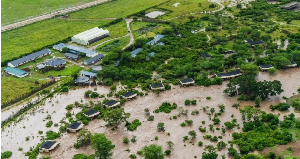Business News of Thursday, 18 November 2010
Source: GNA
GH¢64 million for 2010 Population and Housing Census
Accra, Nov. 18, GNA - The Government provided GH¢64 million to the=
Ghana Statistical Service (GSS) for the conduct of the 2010 Population an= d Housing Census in the country.
The census would provide relevant data on the country's population a= nd structure, households and their profiles, housing conditions, school attendance, literacy and educational levels. This was announced by Dr Kwabena Duffuor, Minister of Finance and Economic Planning, when presenting Government's 2011 Fiscal and Economic Policy to Parliament in Accra on Thursday. He said the census would also provide some of the data needed to ass= ess progress on the six of the 10 Millennium Development Goals (MDGs) and the= ir corresponding targets.
The Sector Minister said the GSS had reviewed the methodology and reference period for the national accounts. The exercise was designed to capture the significant changes that ha= ve taken place in the socio-economic landscape of the country, as well as sustained shifts in the structure, relative composition and distribution of production across and within sectors and activity groups. He said the draft Medium Term National Development Policy (MTNDP), t= he "Ghana Shared Growth and Development Agenda" (GSDA) which would be presen= ted to Parliament before end of the year, contained comprehensive policies an= d strategies to address the growth and development challenges facing the country in the medium-to long-term. Under the GSDA, economic growth and investment in the medium term wo= uld focus on accelerated agricultural modernisation; enhancing the competitiveness of the private sector; developing critical infrastructure= , energy and human settlements; developing oil and gas industry; sustaining=
natural resource management; increasing human resource development, productivity and employment; fostering transparent and accountable governance.
The GSDA expects that the implementation of these policy interventio= ns would support the economy to grow at a rate of 12.3 per cent in 2011, 9.3=
per cent in 2012, and 8.3 per cent in 2013, taking into account the highe= r growth potential of the oil and gas sector. The agricultural sector is expected to grow at an annual average rat= e of 6.1 per cent in the medium term and the services sector, by 8.7 per ce= nt. The industrial sector is projected to grow at 25.4 per cent in 2011 on account of the oil and gas-related infrastructure and increased activitie= s in construction, mining and energy sectors. However, growth in the industrial sector would slow down to 14.1 per=
cent in 2012 and 12 per cent in 2013.
Dr Duffuor said over the medium term, fiscal policy would be guided by the objective of scaling back the fiscal deficit to 7.5 per cent in 2011,=
4.7 per cent in 2012 and 3.0 per cent in 2013. To achieve these fiscal targets, the Government would intensify the on-going reforms in public financial management, improve tax collection, review the import duty exemptions regime, rationalise recurrent expenditures, contain expenditure through public sector pay reform, and address the threat of high debt burden. He said monetary policy would continue to pursue the objective of maintaining inflation rate at single digit without compromising on growth=
and managing the flexible exchange rate regime. To this end, the Bank of Ghana would strengthen its inflation target= ing framework and intensify its engagement with the fiscal authorities to ens= ure a better coordination between fiscal policy and monetary policy in the medium term. Inflation is projected to reach 8.5 per cent in December 2011, dropping to 7.0 per cent in fiscal year 2012.
The Central Bank would engage the banks and non-bank financial institutions, borrowers and investors on ways to enhance the interest rat= e transmission mechanism and getting the existing tight credit conditions relaxed. "The key objective here is to improve access to credit in the econo= my to boost real sector activity", Dr Duffuor said. The Sector Minister said Ghana's trade policy would continue to aim at enhancing international competitiveness and securing market access adding= , "The country envisages a trade-led industrialisation and diversification of the export base through the export of oil and gas, selected niche product= s such as pineapples, mangoes, Shea butter, and palm oil, and also to forge=
strategic trade partnerships." "We must continue to focus our attention on the non-oil sector of th= e economy, particularly agriculture, small, medium and micro enterprises, mining and manufacturing sectors, which, hitherto, have been the backbone= of the economy," he added.
Dr Duffuor announced that the Government had made significant progre= ss in putting the finances of the Government on a sound footing, stabilising=
the economy, and laying the foundation for rapid and sustainable economic=
growth.
However, he said there were a number of fiscal challenges that continued to bother the government. "These challenges relate to the rigidity in the budget structure, management of the public sector wage bill, payment arrears, and the perceived benefits from the oil and gas discovery", he added. On the rigidity in the budget structure, Dr Duffuor said: "Last year= , I mentioned the lack of space for policy shifts in the budget structure. Indeed, the national budget has become very lopsided and a victim of inordinate rigidity caused by the earmarking of a large part of it." "A disproportionate portion of the national expenditure is statutori= ly determined, taking the form of GetFund, NHIS, and District Assembly Commo= n Fund (DACF)", he added.
The Sector Minister explained that the situation was complicated by the need to meet government's contractual obligations such as debt service payments, social security contributions, pensions and gratuities, and wag= es and salaries of government employees some of which would increase with th= e implementation of single spine salary structure. "When these legal obligations of government are met in the budget, no room is left for any policy manoeuvre", he added. The Minister of Finance noted that in the face of the serious rigidities in the budget because of the statutory transfers and contractu= al obligations, implementing the Single Spine Salary Structure would result in inadequate resources for funding of social intervention programmes on a sustainable basis. "Although, the implementation of this new wage policy is stretched o= ver a period of five years, the wage bill for fiscal year 2011 is estimated a= t 12 per cent of GDP, making it one of the highest in sub-Saharan Africa. N= ot only that, but also over 75 per cent of the total wage bill and the associated increases resulting from the Single Spine Salary Structure goe= s to employees in only three MDAs, namely the Education, Health and Local Government, which ironically are the very sectors with the statutory fund= s that introduce rigidities in the budget structure and leaves no space for=
the sustainable implementation of the Single Spine Salary Structure", he stressed.
Dr Duffuor said to ensure that the social intervention programmes of=
Government were implemented on a sustainable basis consistent with the medium term expenditure framework, distribution formulas for Parliamentar= y approvals of the DACF, GETFund and the National Health Insurance Fund wou= ld be structured to allow for up to 30 per cent of such transfers to be used= to finance these programmes. On payment of arrears, he pointed out that payment of arrears had be= en a common feature of the country's fiscal for years, but these had become a serious concern to government in the last two years because of their negative impact on economic growth. The Sector Minister said arrears had serious detrimental effect on t= he economy as they constrained private sector activities, thereby slowing do= wn growth and employment creation. "Arrears in transfers to statutory funds undermine the proper functioning of government by delaying the provision of economic infrastructure required to support economic growth and delivery of much needed social services to improve the lives of our people," he said. Dr Duffuor said government had planned to clear all payment arrears in the medium term to improve fiscal credibility, enhance government's stand= ing with its creditors, strengthen the banking system, and create the necessa= ry fiscal space for government to be able to meet its priority developmental=
goals. The arrears liquidation plan would include; undertaking a comprehens= ive inventory of arrears as part of the GIFMIS; auditing and validating the arrears to establish their genuineness; strictly applying the provisions of the Financial Administration Act and the accompanying Regulations to avoi= d a further build-up of arrears. He explained that already, government had taken measures to strength= en commitment controls to ensure that new arrears were not accumulated. "The Office of the President has issued instructions to all MDAs to obtain Commencement Certificates from the Ministry of Finance and Economi= c Planning before committing government in for new and on-going projects", he added.
News

Canada-based Ghanaian woman wins heart of disguised rich 'beggar' after she offered him free pie
Sports

Thomas Partey, Inaki Williams set for Black Stars return after missing Nigeria, Uganda friendlies
Entertainment

Mahama assigned security protection to me and Oppong Nkrumah when we were criticizing him - A Plus
Opinions



